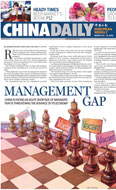Asia
Japan raps nuclear operator over mistake
Updated: 2011-03-28 15:07
(Agencies)
SEA RADIATION DROPS SHARPLY
Murray Jennex, a nuclear power plant expert and associate professor at San Diego State University, said "there's not really a plan B" other than to dry out the plant, get power restored and start cooling it down.
"What we're now in is a long slog period with lots of small, unsexy steps that have to be taken to pull the whole thing together," he said by telephone.
The good news, he said, was that the reactor cores appeared to be cooling down.
There was good news as well about the radiation levels in the sea just offshore the plant, which skyrocketed on Sunday to 1,850 times normal. Those had come down sharply, Hidehiko Nishiyama, deputy director general of the Nuclear and Industrial Safety Agency, told a news conference on Monday.
Though experts said radiation in the Pacific waters will quickly dissipate, the levels at the site are clearly dangerous, and the 450 or so engineers there have won admiration and sympathy around the world for their bravery and sense of duty.
Last week, two workers at Fukushima were injured with radiation burns to their legs after water seeped over their shoes, and on Sunday engineers had to abandon reactor No. 2 after the new reading.
Beyond the evacuation zone around Fukushima, traces of radiation have turned up in tap water in Tokyo 240 km (150 miles) to the south.
Japanese officials and international nuclear experts have generally said the levels away from the plant are not dangerous for humans, who anyway face higher radiation doses on a daily basis from natural substances, X-rays or plane flights.
In downtown Tokyo, a Reuters reading on Monday morning showed ambient radiation of 0.20 microsieverts per hour, well within the global average of naturally occurring background radiation of 0.17-0.39 microsieverts per hour. In Yamagata, a town about 110 km (70 miles) northwest of the stricken plant, the reading was just 0.15.
CHERNOBYL ECHOES
One long-term solution may be to entomb the Fukushima reactors in sand and concrete as happened at Chernobyl, Ukraine, after the 1986 disaster that was the world's worst.
The Japan crisis has prompted a reassessment of nuclear power across the world. It had its most direct political impact yet in foreign politics in Germany at the weekend.
Chancellor Angela Merkel's Christian Democrats lost control of Germany's most prosperous state, Baden-Wuerttemberg, as anti-nuclear sentiment benefited her opponents in a regional vote.
Japanese Prime Minister Naoto Kan has kept a low profile during the crisis, but may face awkward questions after Kyodo news agency said his visit to the region the day after the disaster delayed Tokyo Electric's response to the unfolding situation. Edano on Monday denied that was the case.
The nuclear crisis has compounded Japan's agony after the magnitude 9.0 quake and massive tsunami devastated its northeast coast, turning whole towns into apocalyptic-looking landscapes of mud and debris.
Residents there have been repeatedly rattled by aftershocks from the strongest earthquake in Japanese history, including a magnitude 6.5 tremor on Monday that triggered a tsunami warning.
The latest death toll was 10,804 people, with 16,244 still missing 17 days after the disaster. About a quarter of a million people are living in shelters.
Damage could top $300 billion, making it the world's costliest natural disaster.
E-paper

Rise and shine
The Chinese solar energy industry is heating up following recent setbacks in the nuclear sector
Bombs aim for regime change
CSI, with a twist
Literary path
Specials

Peony express
Growers of china's unofficial national flower are reaching out to europe for help

Tea-ing up
More turning to Chinese tea for investment opportunities like vintage wine

A cut above
The ancient city of Luoyang is home to a treasure trove of cultural wonders.
